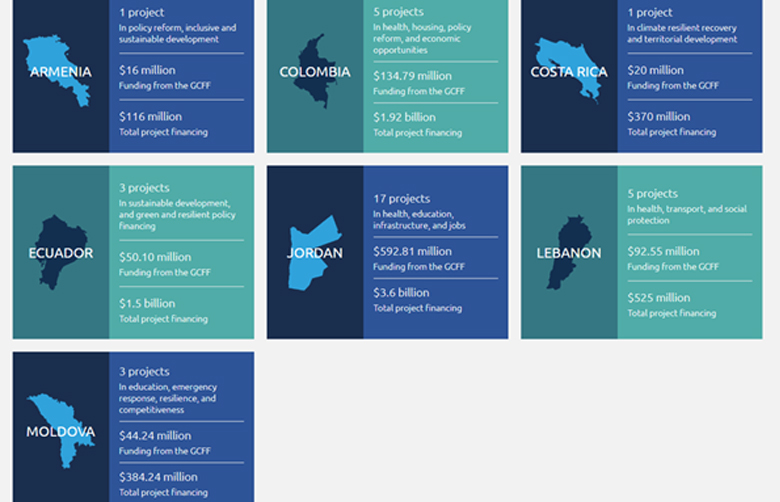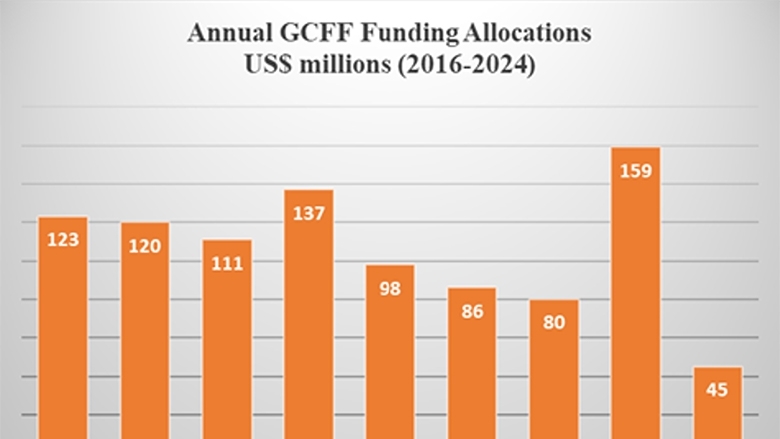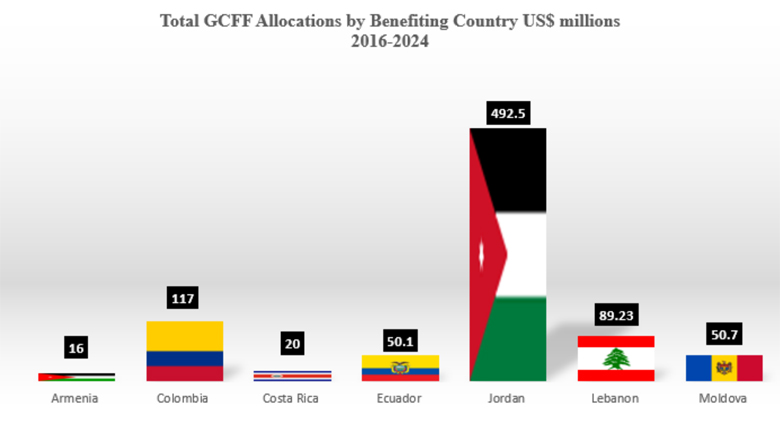The Global Concessional Finance Facility (GCFF) brings an innovative financing mechanism to support countries hosting large numbers of refugees. From its inception in 2016 to March 31, 2024, the GCFF, whose secretariat is housed at the World Bank, provided $953 million in grants, enabling over $7.3 billion in loans on concessional terms from partner Multilateral Development Banks (MDBs). This financing has supported 35 projects in Armenia, Colombia, Costa Rica, Ecuador, Jordan, Lebanon, and Moldova, directly reaching 15.8 million beneficiaries, including 6.3 million refugees and 7.2 million host community members. GCFF-supported operations have provided essential health and nutrition services to more than 2.5 million people, enabled over 2.5 million refugees to work in their host countries, and improved access to sustainable infrastructure and municipal services for at least 1.2 million people. GCFF support has also facilitated the development of progressive refugee policies through Development Policy Operations (DPOs) financed by the World Bank and other MDBs in Colombia, Ecuador, Jordan, and Armenia.

Photo: World Bank
STORY HIGHLIGHTS
- As of 2023, GCFF-supported operations to date have directly reached 15.8 million beneficiaries, including at least 6.3 million refugees and 7.2 million host community members.
- Over 2.5 million people have received essential health and nutrition services—including over 1.5 million in Colombia and almost 1 million in Jordan.
- More than 2.5 million refugees have received the right to work in their hosting countries: 2.3 million in Colombia; over 140,000 in Ecuador and approximately 85,000 in Jordan.
"Thank you for including Armenia as one of the beneficiary countries. The intensity of refugee flows, combined with protracted crisis from the past have put a tremendous strain on services in the country during the last months. We appreciate your support and agility in providing us funds from GCFF,’’
Eduard Hakobyan, Deputy Minister of Finance, Armenia.
Challenge
Against a backdrop of deepening global refugee crises, an increasing number of middle-income countries (MICs) are opening their doors to host refugees, migrants, and asylum seekers. Despite having only 37 percent of global GDP, MICs host 75 percent of the world’s refugees. As of 2023, there were 36.4 million refugees, 6.1 million asylum-seekers, and 5.3 million others in need of international protection. Despite providing a global public good by hosting significant numbers of refugees, MICs do not have access to the same levels or types of concessional and grant financing available to low-income countries (LICs) to address fiscal stresses on services, infrastructure, and the economy.
Approach
The GCFF was established in 2016 by the World Bank, the United Nations (UN), and the Islamic Development Bank (IsDB) as a response to the Syrian refugee crisis, in which many fleeing Syrians sought refuge in Jordan and Lebanon. The GCFF targets the financing gap that faces many MICs that host large numbers of refugees. Without access to financing, MICs are often hesitant to borrow and take on debt in order to support refugees. The GCFF offers an innovative financing mechanism to address this reluctance by lowering the cost of loans. It works by using contributions from Supporting Countries (which include Japan, the United States, seven European countries, and the European Commission) to reduce the borrowing costs for development projects that benefit both refugees and host communities. It further supports such projects by leveraging loan financing from five partner multilateral development banks (MDBs): the European Bank for Reconstruction and Development (EBRD), European Investment Bank (EIB), Inter-American Development Bank (IDB), the IsDB, and the International Bank for Reconstruction and Development (IBRD), as the partner MDBs provide lending operations that are supported through the GCFF.
The GCFF focuses on supporting projects that promote resilience, stability, and economic opportunities. It is committed to ensuring sufficient, predictable, flexible, and scalable financing that can help meet the needs of both refugees and host communities, while also promoting policies to promote refugee inclusion and integration. Since its inception, the GCFF as an innovative financing mechanism to support countries hosting large numbers of refugees has expanded its global footprint to seven benefiting countries: Armenia, Colombia, Costa Rica, Ecuador, Jordan, Lebanon, and Moldova.
Results
As of March 31, 2024, GCFF-supported operations have directly reached 15.8 million beneficiaries, including 6.3 million refugees and 7.2 million host community members. This includes almost 2.5 million people who received essential health or nutrition services under GCFF-supported operations (over 1.5 million in Colombia and almost 1 million in Jordan). Over 2.5 million refugees have received the right to work in their hosting country: 2.3 million in Colombia; over 140,000 in Ecuador; and approximately 85,000 in Jordan. Over 1.2 million people have benefited from improved access to infrastructure or municipal services to date, the vast majority in Lebanon. The projects supported by GCFF cut across a range of sectors, including job creation, expanding vital public services (for example, health and education), and developing sustainable infrastructure. Some examples illustrate the breadth and variety of the projects supported by the GCFF.
In Colombia, the Social and Economic Integration of Migrants DPF project, which received financing from a World Bank loan of $500 million and a $26.4 million GCFF concessional grant, has supported the integration of Venezuelan migrants in Colombia. This was coordinated with a sister project financed by the IDB: the Program to Support Policy Reforms for the Social and Economic Inclusion of the Venezuelan Migrant Population in Colombia with a loan of $300 million and a $17.59 million GCFF grant, which GCFF support helped facilitate and enable. These projects provided critical support to the Colombian government in creating the Single Registry for Venezuelan Migrants (RUMV) to facilitate access to identification, socioeconomic data collection, and accurate targeting of education, health, and social protection programs.
More than 2.4 million Venezuelan migrants have registered in the RUMV system. As a result, Venezuelan migrants have been able to access essential services and employment opportunities, contributing to the growth and development of both the migrants and the host communities. The government has surpassed the goal of regularizing the immigration status of 1.1 million migrants, achieved gender balance, and registered over 924,000 Venezuelan migrants for social security and health services. The success of these sister projects in delivering vital services underscores the importance of comprehensive and collaborative approaches by the World Bank and IDB to address the challenges faced by migrants and refugees worldwide.
In Jordan, the Economic Opportunities for Jordanians and Syrian Refugees Program-for-Results which received $400 million financing from a World Bank loan and a $51 million GCFF grant led to significant increases in the number of work permits issued to Syrian refugees, which increased from 37,000 in 2016 to over 90,000 in 2023. Since April 2016, work permit fees have been waived, and the permits now offer Syrians the flexibility to work across sectors and change employers. Other restrictions have been progressively lifted, allowing refugees in camps to obtain permits, enabling home-based businesses and self-employment in certain sectors, and extending social security coverage to refugees. The project also supported the simplification of private sector regulations, including for home-based businesses and food handling businesses, resulting in the licensing of over 3,900 licensed home-based businesses between 2021 and end-2023, including 141 Syrian refugee-owned businesses.
Data Highlights



World Bank Group Contribution
Financing to countries supported by GCFF by the five partner multilateral development banks (MDBs): the European Bank for Reconstruction and Development (EBRD), European Investment Bank (EIB), Inter-American Development Bank (IaDB), Islamic Development Bank (IsDB), and the IBRD has enabled over $7.3 billion in loans on concessional terms. Moreover, the World Bank hosts the GCFF secretariat and serves as its Trustee, facilitating the work of the facility, promoting dialogue among stakeholders, and ensuring effective management, financing, allocations and reporting.
Partnerships
The GCFF’s work is financed by contributions from supporting countries. As of May 2024, they supporting countries contributed the following: Japan, $184 million; United Kingdom, $175 million; United States, $135 million; Germany, $102 million; the Netherlands, $92 million; Denmark, $78 million; Norway, $72 million, Canada, $55 million, Sweden, $50 million; and the European Commision, $5 million.
The GCFF, as a global partnership, provides a platform that brings together benefiting countries, Supporting Countries, MDBs, and the UN to support dialogue and coordination among these stakeholders in advancing policies and programs for economic and social inclusion. This structure enables benefiting countries to contribute to shaping priorities for GCFF as they receive support, and it facilitates the exchange of knowledge and good practices among stakeholders.
For example, the UNHCR, with a wealth of experience and knowledge working on refugee issues, is well-placed to provide valuable advice on challenges and priorities. UNHCR’s expertise has benefited the Facility and helped to strengthen its refugee-related focus. Accordingly, the role of the UNHCR has expanded in the GCFF. For example, UNHCR’s Refugee Policy and Protection Review (RPPR), provides reviews of refugee-oriented policy frameworks and a forward-looking analysis of opportunities and risks, based on and aligned with the overall approaches of IDA’s Refugee Protection Assessment (RPA) and the Refugee Policy Review Framework (RPRF). These reviews provide advisory inputs to the GCFF Steering Committee to inform decisions related to the eligibility of new benefiting countries and provide an analysis of policy opportunities and risks for both new and existing BCs. The RPPR has been used to assess the candidature of Armenia, Costa Rica and Moldova as Benefiting Countries to the GCFF recently and guided their inclusion.
Looking Ahead
With a demonstrated track record of supporting refugee-hosting MICs since 2016, the GCFF will continue to provide support to both current and new benefiting countries and respond to refugee crisis situations around the world. Key priorities include strengthening country level coordination to ensure better targeting of interventions, generating knowledge and lessons learned from GCFF-supported initiatives contributing to the global community of practitioners working on forced displacement issues, and strengthening the current funding model to make it more flexible, responsive, and predictable.

